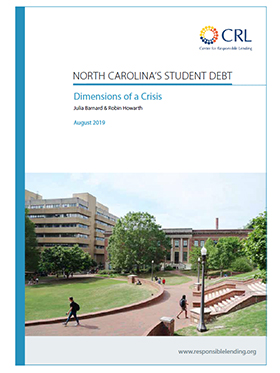While pursuing higher education is still a pathway to higher incomes over a person’s lifetime, student loan debt threatens to undermine this promise in North Carolina and nationwide. Outstanding student loan amounts have risen at an alarming rate over the past decade, and North Carolina has not been immune from this trend. Today, students and their families face a difficult decision: take on substantial debt to fill the gap between ballooning college costs and reduced grant support or forgo a college education in the face of a labor market that increasingly demands credentials and degrees. The impact of this choice is particularly severe for some populations: communities of color, rural and low-income communities, veterans and servicemembers, women, and older Americans.
Over 44 million Americans hold more than $1.5 trillion in student loan debt, and over 1.2 million North Carolinians alone hold $44 billion in student loan debt. This affects the state’s economy as student debtors delay or forgo homeownership, starting their own businesses, family formation, and/or saving for retirement and other long-term goals out of concern about their financial stability. The impact spans generations—parents and grandparents can also hold student loans for themselves or their family members, reducing their ability to save for retirement or, once in retirement, exposing their Social Security benefits to offsets should they default. Today, the majority of Americans across the political spectrum agree that student loan debt is a crisis.
Changes to this paper were made on September 11, 2019. Original draft available upon request: carol.hammerstein@responsiblelending.org.
